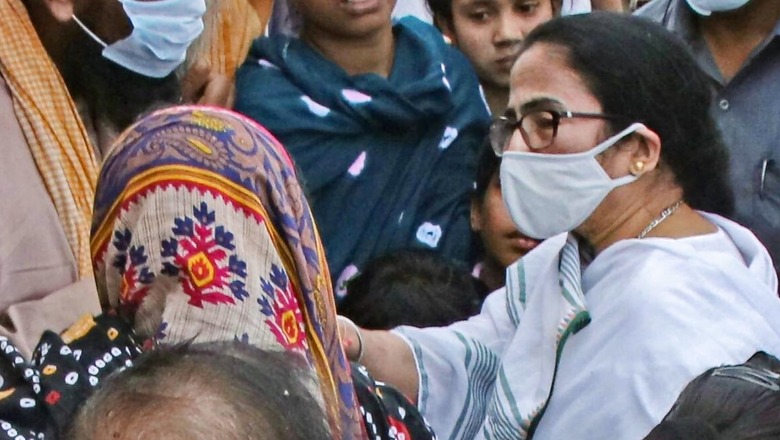
views
The latest bout of political violence in West Bengal is gruesome, but follows the cycle of violence in Bengal, starting from before 1947. News 18 reports that eight people were burnt alive by a mob in Bogtui village in Birbhum district. This itself is believed to be in retaliation for the killing of local Trinamool Congress’s Panchayat leader Bhadu Sheikh. While Twitter rumours jumped the gun in claiming that the victims were Hindus, making it into a story of Muslim on Hindu communal violence, it soon became clear that both the victims and the perpetrators were Muslim and that it was a political rivalry turned gory. What explains the raging political violence in West Bengal versus other states in India?
Of course, West Bengal has not been immune to systematic communal violence. In the book, Bengal’s Hindu Holocaust: The Partition of India and Its Aftermath, Sachi Dastidar documents the steadily eroding Hindu demography in greater Bengal. As he mentions in the introduction, “…loss of population, depending on the rate of growth of population used, is anywhere between 45 million and 50 million Hindus lost from the Bangladesh census. The number of Hindus who lost their lives beginning with the 1946 Noakhali Danga pogrom will surpass 3.1 million.” These are enormous figures pointing to the scale of violence of genocidal proportions. But how is it relevant to violence in Birbhum?
Political violence in Birbhum points to a larger problem— a climate of intolerance towards the “other.” This stems from essentially two ideologies, the first—which shows up under the decline of the Hindu population in Bengal— is rooted in Islamic intolerance of the “kaffir” or unbelievers, who according to their seminal text, are called the “worst of creatures.” This has repeatedly shown itself in history where once Hindu-Buddhist areas of Afghanistan, Pakistan and Bangladesh have been steadily cleansed of “non-believers.”
However, the problem with an ideology of exclusivism is that it does not end there. The intolerance towards the other shows up in every split, whether theological or political. Thus, Muslim sects in Pakistan remain at war with each other, with Sunni terror targeting Shia, and both of these targeting Ahmadiyya Muslims. The Sunni Islamic State claimed responsibility for the recent attack on the Shia mosque in Pakistan that killed at least 62 people and injured nearly 200. It is believed to be carried out by a suicide bomber and is part of a pattern of attacks on the Shia Muslim minority in Sunni dominant Pakistan. Thus, when an ideology of exclusive belief (“we are going to heaven, others are going to hell”) splinters, each part exhibits the same antipathy towards the other. This is an endless cycle.
However, the problem in West Bengal has not been related to religious violence alone. The long communist rule in West Bengal also cemented political violence. Historian Sugato Bose said, “Initially it was clashes between the communists and the Congress, then came the Naxalite period during which various factions of communists sparred. When the Left was in power, they used intimidation to rule over common people. Long history of single-party domination, especially 34 years of Left rule, is one of the key reasons behind the state’s legacy of violence.”
The ideology of Communism also creates and fosters an exclusive belief system set up in the narrative of “class struggle”— a conflict between the bourgeoisie and the proletariat. Just like the Islamic version sees the triumph of the believers over the kaffirs and the attainment of Jannat or Islamic heaven, the Marxist version sees a final triumph of the proletariat over the bourgeoisie, leading to Marxist Jannat, first by a planned state controlled by labor and then by the state “withering away.” Both these versions of future heaven remain unattainable in this world, but that does not stop the dynamic of violence from the followers. The “other” is evil and needs to be eliminated.
The TMC dispensation in Bengal initially positioned itself as a break from the decades of Congress-Communist rule but as Ishan Mukherjee wrote “when the TMC came to power in 2011, a large section of the lumpen cadre-base of the Left parties seamlessly switched over to the TMC.”
As Tathagata Roy, the former Governor of Tripura and Meghalaya, writes in the foreword to the book Political Killings in Mamata’s Bengal, Bengal “for 34 long years, was run by a Stalinist party who did not believe in the rationale of the existence of any rival party.” Thus, all instruments of the state were made subservient to party interests.
“The present incumbent government has merely copied their methods to the last letter.
How does this corrupt system work? With the previous party in power, it worked with their well-regimented party doing the necessary murders, rapes or tortures with instructions from the top flowing smoothly down to the bottom to their cadres and the police looking the other way. This happened in the Sain Bari, Anandamargi, Bantala and other murders. The party now in power also makes the police look the other way or slap false cases on rival party workers, but their party is too disorganised to do it like their predecessors. In their cases, local chieftains do the murders for local reasons. The police of course look the other way as before and the Supremo rubbishes all allegations.”
Roy’s words appear prescient in the analysis of the violence in Birbhum where “local chieftains do the murders for local reasons.” Once a culture of political and religious intolerance has set in, and where the state has been compromised as an appendage to the party, such cycles of retributory violence are inevitable. Unfortunately, there does not appear to be an easy way out for West Bengal.
Sankrant Sanu is the author of the book ‘English Medium Myth’ and the founder of Garuda Prakashan. The views expressed in this article are those of the author and do not represent the stand of this publication.
Read all the Latest Opinion News and Breaking News here


















Comments
0 comment